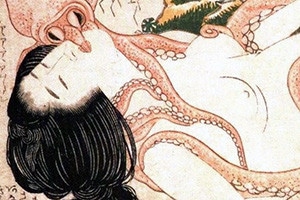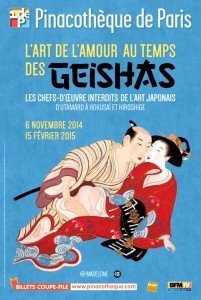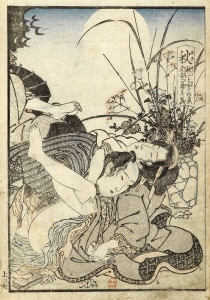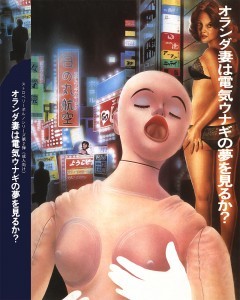“Dirty” Cultures Swept Under the Rug
It isn’t only the old things, Japan also tends to reject cultural activities that relate to certain themes. These include creations that have strong political themes or violent scenes, but especially “ero” (the Japanese short for eroticsm) is especially well-known.
Those that are accepted as artistic expression in other places may not be treated in Japan as such, and may even be rejected from art museums and centers of research or preservation. This is in a country where adult magazines are placed on the shelves of convenience stores at every corner. An absolutely baffling situation from the perspective of a Frenchman.
The recent “Shunga” (春画, Ukiyo-e with erotic themes) exhibition is a good example. Shunga is treated as a form of art for its unique expression and is an object of admiration. But in Japan, this form of expression from a century ago is treated more like pornography, a taboo of sorts, rather than a form of art. This makes large-scale exhibitions nearly impossible because of the difficulty of finding sponsors and the fear of complaints. This time, after much difficulty, an exhibition will finally be held in September. At the same time, within the film industry, we have movies like “In the Realm of the Senses”, which haven’t been able to be aired fully in theatres because of their sensitive content.
Shunga Exhibition at Alte Pinakothek in Paris (2014-2015)
“Ero” as Merchandise, “Ero” as Art
Walking around in Shinjuku we can find signboards of brothels and such. At the same time, the shop windows of convenience stores of streets where children often pass by have magazine covers of semi-nude women lined along them. Yet in art museums, cameramen and artists who take their work seriously have their work censored, and movie critics are forced to go to Europe to see certain movies in full. This current situation in a whole is absolutely mind-boggling.
In France, we separate sexual content into merchandise and art, a very clear distinction. Merchandise is kept out of plain sight, but in galleries and similar places, we respect the creators fully to allow for criticism and research. Furthermore, even if something was treated as merchandise, once it has been brought to the realm of art, it will be treated as such from then on, open to admiration and discussion in artistic terms.
We treat this sort of platform as a matter of fact and, of course, sensational works invite their share of criticism. All of that included, this kind of discourse is required for the creation of new works.
One of the Shunga available for viewing at the National Library of France (online digital archive)
Losing Cultural Treasures
Japan hold “common sense” and “order” in high regard, so perhaps art has to be reduced to a position where those can function properly. The preservation of shunga from the Edo period and erotic movies from the 80s have faced resistance because of the taboo on them. Even if we consider other kinds of content, such as products developed as merchandise, or art that has a limited number of audience, or creation that is not recognized as art, the exhibition or research of them is difficult. Game preservation is the ultimate example.
In other countries, games have already been recognized as art and research on the preservation of them has begun. The government and universities of Japan are, slowly but surely, moving towards the same direction, but there is still a strong sentiment that games should not be treated as art. Even Ukiyo-e was originally produced as merchandise. Even some of the works of da Vinci and Bach, whose works are now considered, undeniably, art have some that were ordered, and therefore are merchandise.
If Europeans thought of these as merchandise and not art and discarded them throughout the years, what would be left in our world now? Cultural treasures should not be preserved “after” they are considered a treasure. Japan has lost many of its treasures because of this. It is about time we change this.
The Movie, “Madam Black Rose” (団鬼六 黒薔薇夫人) by Oniroku Dan of Nikkatsu Roman Porno (1978)
Let’s talk about Eroge.
The Agency for Cultural Affairs of Japan has announced a consumer game database called the Media Art Database this year. This was a movement to acknowledge games as a part of the culture, along with manga etc., but it excludes information of the eroge of many platforms, including the NES.
I am honestly glad that the country has moved towards accepting games as art but, as with shunga, sexual content being excluded from lists for research and preservation purposes is, I think, wrong. Eroge as a genre is very intriguing as it is unique to Japan and not seen anywhere else in the world. Eroge is different from pornography elsewhere, exhibiting a variety of creative effort, making it display uniquely Japanese characteristics. The eroge of the 80s, especially, did not get introduced overseas because of platform issues. They are so unique and creative that if they were reappraised, I wouldn’t be surprised if an exhibition would be held for it in somewhere in Europe.
Since Japan is exporting anime, manga and other material under “Cool Japan”, they should also do the same for the eroge of the 80s. Instead, they exclude them from their lists and seem to feel a sort of embarrassment of treating eroge as a part of the culture.
The label of the Game “Do Dutch Wives Dream of Electric Eels? ” (1984)
Let’s Act Now, for the Future
Quite often we are told “Don’t tell me you preserve eroge as well” The answer to that is yes we do because we feel that any kind of material may be reviewed in the future and its value rediscovered. More so for material that is ostracized by many other organizations.
I always say that if Japanese games of the 80s degrade and are lost, that would mean they would be erased from history forever. The Japan-made PCs of the 80s only exist in Japan, and the floppy disks from that time are already starting to grow mold and their data are lost. Even if they were made as merchandise, or if they contained erotic content.
These contents are endemic to Japan and are very vulnerable. So Japan should prioritize their protection, shouldn’t they? To entice the world with more Japanese culture, Japan should be cool with preserving and researching erotic content. In that way, Japan can truly be “Cool Japan”. I too love Japan as one of its people, and I will continue to support this country in the field of game preservation so that it can become a cultural power in the world.
Game Preservation Society, Joseph REDON
Translated by Ming TEE
※The copyright of images belongs to their rightful owners.




